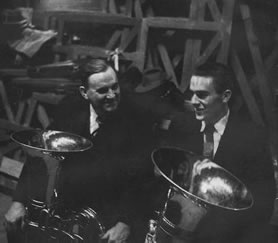A View from the Back RowSeeing the large percentage of players who aspire to play in a symphony orchestra in the recent poll, What do you Wish for Your Musical Future? (Issue 6), I thought it would be interesting to take a look at the realities of what you are wishing for.During my 35 years of playing in symphony orchestras - the Rochester Philharmonic, the Concertgebouw Orchestra of Amsterdam, the Los Angeles Philharmonic, and finally and occasionally the Maggio Musicali Orchestra of Florence, Italy - there have been wonderful and unforgettable times of triumph and celebration, but there is another side that is worth reviewing: the life in the back row of a symphony orchestra does not always have the fame and glory aspect of our dreams! It’s strange; there seems to really be a back row mentality. My first back row experience was in the Rochester Philharmonic in 1956. At my first rehearsal (I was 18), I looked down the trombones during the rests in a rehearsal of Petroushka and saw that the 1st trombone was reading a gun magazine, the 2nd trombonist was studying for his engineering degree and the bass trombonist, my teacher, was reading Time Magazine. That was my first view of the reality that not everybody approached his or her job in the orchestra as an idealist. Sometimes the position we take in the back row becomes a way of thinking; when any of the orchestras I’ve played in traveled, the trombones and tuba sat in the back of the bus. Retrospectively I’ve never figured out just why. Of course the back row is not always the trombone and tuba players. In the Concertgebouw Orchestra in the early 1960’s, there were 5 scales for calculating salary: 1. The concertmaster and the solo cellist both had a special personally negotiable salary; 2. Principal players; 3. Solo players, that included piccolo, English horn, Eb and bass clarinet, contra bassoon, 3rd horn, bass trombone, tuba, harp and piano; 4. All the rest of the tutti players in the orchestra except for… 5. The contrabass section, that were paid the lowest salary in the orchestra! That was the situation for the contrabass players then; subsequently the situation has been corrected and they are paid the same as the other tutti players. However, as you can imagine, that situation did not create good feelings in the orchestra from the bass players in the back row of the string section! In the Concertgebouw Orchestra in the 60’s, if one started from the conductor’s podium and slowly walked to the back of the orchestra, it seemed that the IQ would drop 10 points each step up the risers... all the way up to the back row where my colleagues and I sat! Very quickly, I want to give an explanation of why one could have so easily gotten that impression. In the back row players have a lot of time on their hands, and this often leads to pursuits other than those of musical excellence. A little history: When I was 18 years old, playing my first year in the Rochester
Philharmonic and in my first year at the Eastman School of Music, I was asked
to play 2nd tuba in the Berlioz Fantastic Symphony with the New York Philharmonic
on their tour while they were in Rochester. To say that I was excited would
have been a huge understatement; I was going to be sitting next to William
Bell, my tuba hero, in one of the great orchestras in the world, which I had
been listening to on the radio every Sunday morning since I was 12. This was
happiness! Of course, I had studied the symphony. I had grown to love that
work, and I was ready. It was one of those unforgettable experiences that come
much too infrequently. Once I made an interview with Arnold Jacobs for Brass Bulletin and asked him the question, “How do you deal with the first 3 movements of the Berlioz Fantastic Symphony and other such pieces?” His answer was, “Oh, I always look forward to the Fantastic Symphony, it gives me an opportunity to listen to my wonderful colleagues in the Chicago Symphony playing.” I admire Arnold Jacobs deeply and I envy him, since I myself was absolutely unable to maintain that attitude. I only tell this story to try and make some explanation of why the IQ seemed to drop on the Concertgebouw Orchestra as you walked from the podium toward the back row; is it possible that after years of sitting and waiting to play their few notes they were suffering from boredom? A good mind is a sad thing to waste. It’s not difficult to understand why string players, who have to play difficult passages all the time, are quite frustrated at the reality that the wind and brass players make more money. We can understand this frustration, but the string players need to understand how extremely difficult it is for us to set in the back row and do nearly nothing! To exacerbate that situation, since I have started conducting more frequently I have learned that the trombones and tuba (the back row) are sadly less important that I thought they were when I was sitting in that back row; I have frequently been surprised when I’ve had to ask some wonderful sounding tubist to play less loud! But this is not a bad thing; it would have been more difficult if I didn’t think my position in the orchestra was very important. Well, it was very important, just not as important as I thought! Once in Los Angeles when we were very unoccupied and needed a creative outlet, the back row created an evil prank. One of our trumpet players had developed a wonderful practice product called the B.E.R.P. (Buzzing Extension and Resistance Piece), which enabled brass players to buzz on the mouthpiece while it was in the horn. It works, and many of my students use it. But the combination of creativity and free time the back row led to the low brass running an ad in the international trombone magazine for a F.A.R.T. (forced air resistance tube)! Everyone found this quite humorous… apart from the producer of the B.E.R.P., who made it very clear to us that we were never to make that joke again, so that was the end of it! A professional life in the back row can be quite fun and musically gratifying up to a point; however, the time comes when we must, for mental and musical health, develop some interests in our lives other that counting the rests and playing our single line fragments and doomsday licks. If I had it to do all over again what would I change? Very little, but perhaps I would have taken conducting seriously a lot sooner. Lausanne, Switzerland - October 17, 2004. |


 Photo: Roger Bobo and William Bell back stage at the Eastman Theatre in Rochester,
NY
Photo: Roger Bobo and William Bell back stage at the Eastman Theatre in Rochester,
NY